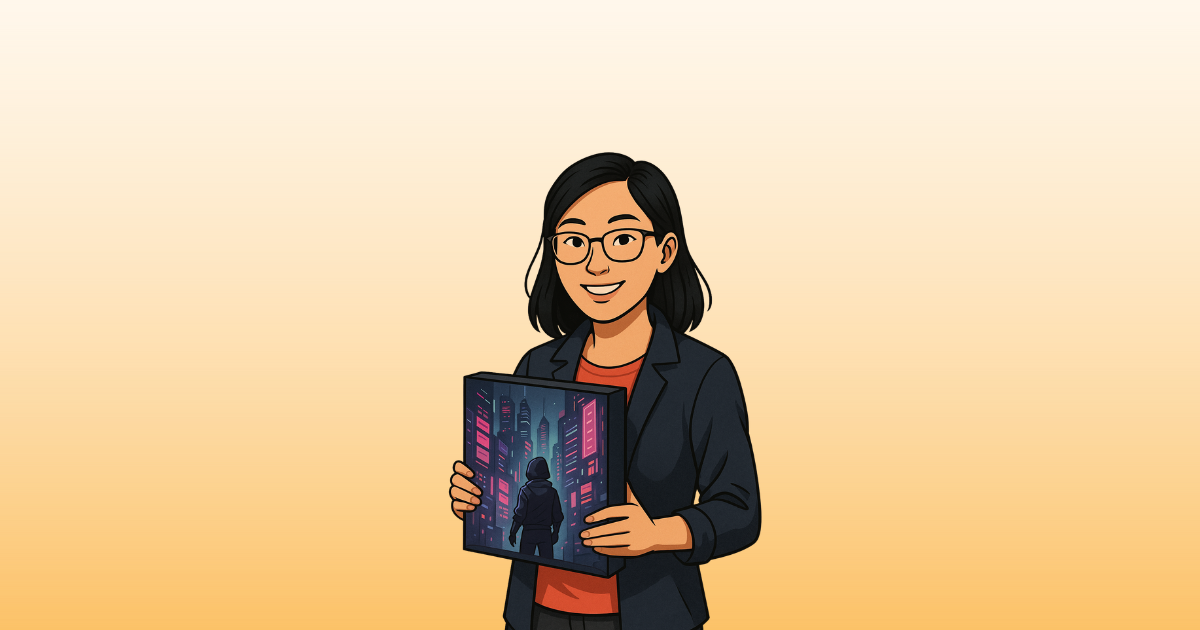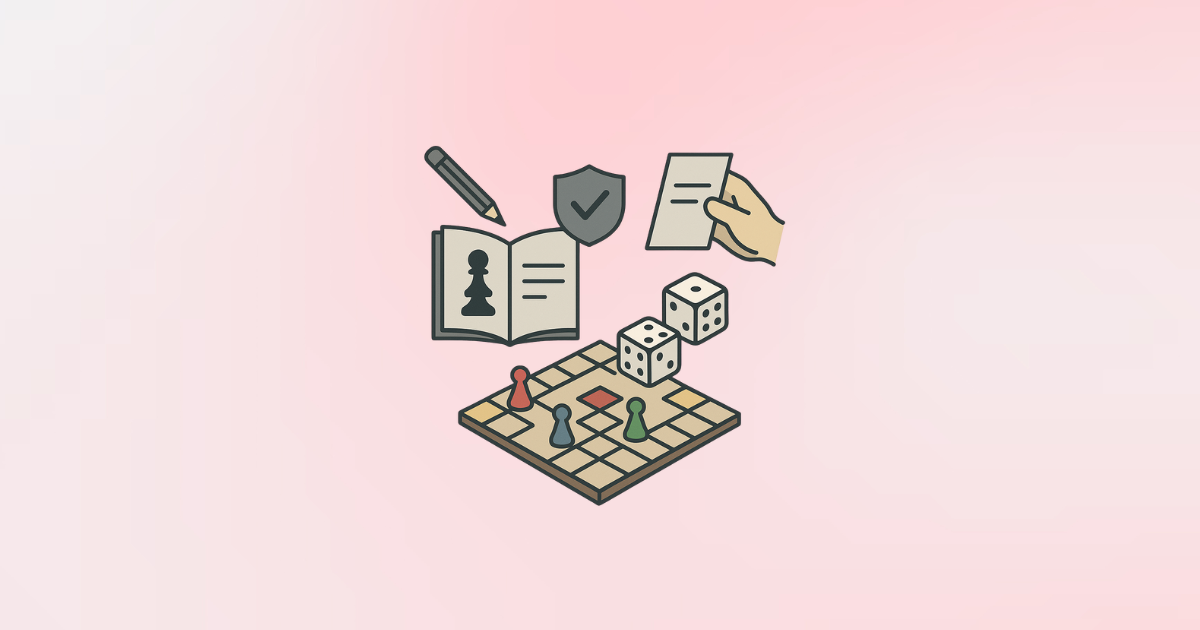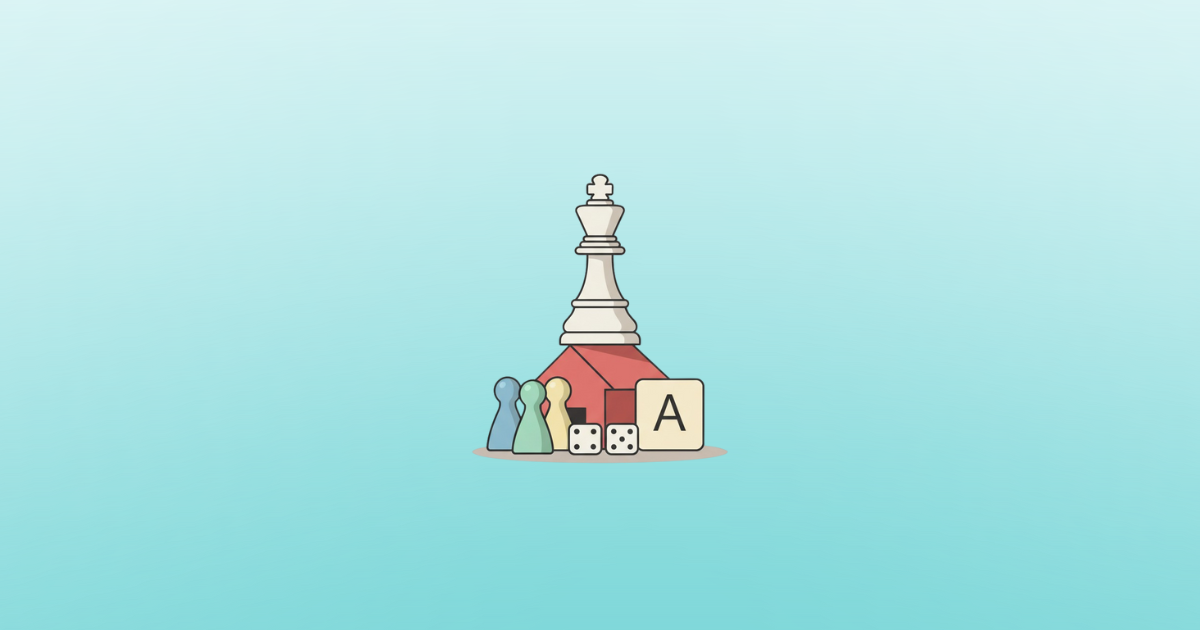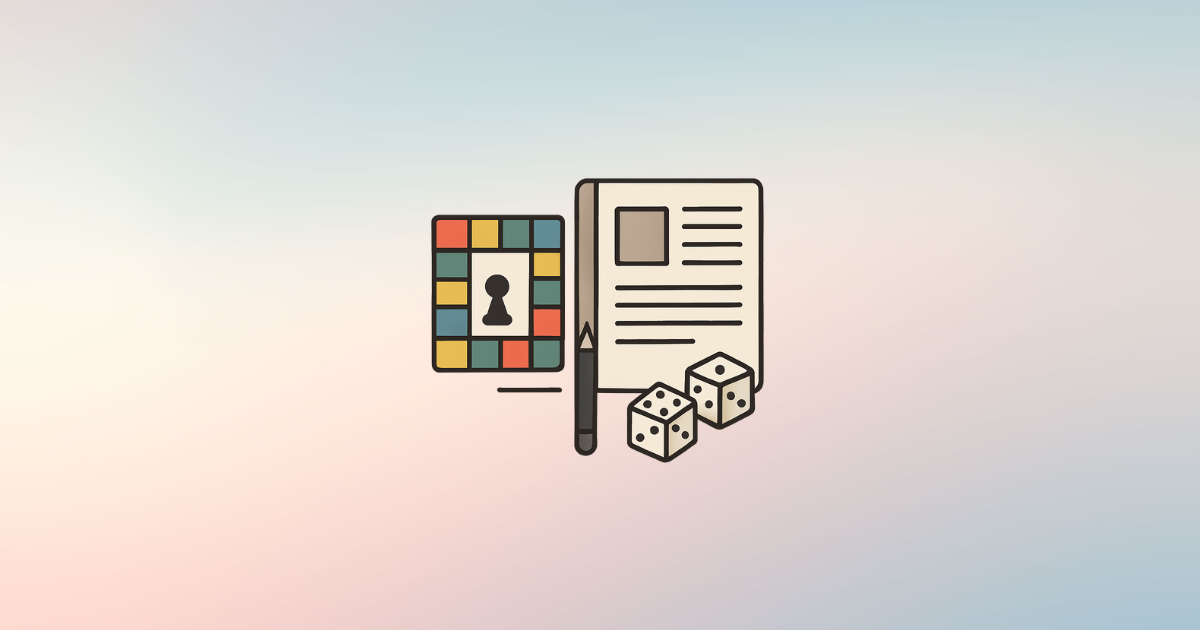"I never thought I'd actually finish it." Maya Chen laughs as she holds up a pristine copy of Neon Districts, her cyberpunk-themed board game that just launched on Kickstarter. Six months ago, she was a software engineer with a game idea scribbled on napkins. Today, she's a published game designer with over 2,000 backers supporting her vision.
Maya's journey from concept to table isn't just inspiring—it's instructive. Her story reveals the real challenges first-time designers face and the modern tools that can help overcome them. Let's walk through her remarkable transformation from dreamer to designer.
The Spark: When Ideas Won't Let Go
March 2025 - Coffee Shop Revelation
Maya's story begins like many great games do—with frustration. "I was playing this cyberpunk-themed game with friends, and it just felt... wrong," she recalls. "The theme was amazing, but the mechanics didn't match. You're supposed to be these slick hackers, but you're just rolling dice and moving around a board like it's Monopoly."
That night, Maya couldn't sleep. Her mind raced with possibilities: What if players actually felt like hackers? What if information was currency? What if the board itself represented the digital world they were infiltrating?
"I started sketching on whatever I could find—napkins, receipts, the back of my grocery list. By morning, I had this rough idea for a game where players would hack into different districts of a neon-lit city, each with unique challenges and rewards."
The First Reality Check
Like many first-time designers, Maya initially thought her idea was completely original. A quick search on BoardGameGeek brought her back to earth. "There were dozens of cyberpunk games already. I was devastated for about ten minutes, then I got excited again. None of them did exactly what I wanted to do."
This early research became crucial. Instead of discouraging her, it helped Maya identify what would make her game unique: the focus on information gathering, the modular district system, and the asymmetric hacker roles that would define Neon Districts.
The Reality: From Dreams to Cardboard
April 2025 - Building the First Prototype
Maya's engineering background helped with systematic thinking, but game design presented new challenges. "In software, if something doesn't work, you debug it. In games, if something isn't fun, you have to figure out why and fix the fun itself."
Her first prototype was embarrassingly simple: index cards for districts, poker chips for data tokens, and a board drawn on poster paper. But it was playable, and that's what mattered.
"I was so nervous showing it to my partner, David. What if it was terrible? What if I'd wasted weeks on something completely broken?" The first playtest revealed both promise and problems. The core hacking mechanic was engaging, but the game dragged on for two hours with no clear end in sight.
The Iteration Cycle Begins
Maya learned quickly that game design is about iteration. Her second version introduced time pressure through security alerts. The third added the district specialization that would become the game's signature feature. Each version taught her something new about her own game.
"I kept a design journal—something I'd never done before. Every playtest, every change, every 'what if' got written down. Looking back at those early entries is wild. I was so worried about tiny details that didn't matter, and completely missing huge problems."
The Challenge: Making It Professional
June 2025 - The Rulebook Nightmare
By summer, Maya had a game that worked. Friends enjoyed playing it, and she'd refined the mechanics through dozens of iterations. But when she tried to write formal rules, everything fell apart.
"I wrote what I thought was a complete rulebook—twelve pages of detailed explanations. Then I gave it to my coworker who'd never seen the game before. She read it for twenty minutes and said, 'I have no idea how to play this.'"
Maya's first rulebook suffered from the curse of knowledge. She explained complex interactions before covering basics, used inconsistent terminology, and assumed players would understand her designer shorthand.
"I rewrote it four times. Each version was better, but still not good enough. I was spending more time on the rulebook than I had on the entire game design. It was incredibly frustrating."
Discovering Modern Solutions
That's when Maya discovered Rulebook.gg. "A friend recommended it after watching me struggle for weeks. At first, I was skeptical—how could software help me write better rules? But I was desperate enough to try anything."
The AI-assisted approach transformed Maya's process. Instead of staring at a blank page, she could describe her game conversationally and get a structured first draft. "It wasn't perfect, but it gave me a framework. Instead of wondering how to organize everything, I could focus on making the explanations clearer."
The tool's built-in best practices helped Maya avoid common pitfalls. It suggested consistent terminology, flagged unclear explanations, and even helped her identify rules she'd forgotten to include.
"The biggest revelation was the examples feature. The AI would generate realistic gameplay scenarios that showed how rules worked in practice. I could see immediately where my explanations were confusing."
The Breakthrough: Finding Her Voice
July 2025 - Playtesting with Strangers
Armed with a clearer rulebook, Maya took her game to a local board game café's designer night. This was her first time teaching Neon Districts to complete strangers—a terrifying but necessary step.
"I was so nervous I almost chickened out. But the organizer, Jeff, was incredibly welcoming. He said, 'Everyone here has been where you are. We want to help.'"
The feedback was honest and invaluable. Players loved the theme and core mechanics but found the scoring system confusing and the endgame abrupt. More importantly, Maya learned she could teach her game to strangers—they actually enjoyed it.
"That night changed everything. I realized I wasn't just making a game for myself and my friends. Other people could connect with my vision. That's when I started thinking seriously about publication."
Refining Through Community
Maya became a regular at designer meetups, online forums, and playtesting groups. Each session revealed new insights. She learned that her game's sweet spot was 45-60 minutes, that the asymmetric roles needed better balance, and that players wanted more meaningful choices during the hacking phase.
"The community was incredible. Other designers shared their experiences, pointed me toward resources, and gave honest feedback. I wasn't alone anymore—I was part of something bigger."
The Polish: Professional Presentation
Early August 2025 - Art and Assets
Maya knew she needed professional artwork but had no idea where to start. "I can design user interfaces, but game art is completely different. I needed help."
Through designer forums, she connected with Elena Rodriguez, a freelance illustrator specializing in sci-fi themes. Elena's cyberpunk aesthetic perfectly matched Maya's vision for Neon Districts.
"Elena understood immediately what I was going for. She took my rough sketches and programmer art and transformed them into this cohesive visual world. The game suddenly felt real."
Rulebook.gg's Asset Management
As artwork came in, Maya used Rulebook.gg's asset management features to organize everything. "I could upload Elena's illustrations, organize them by district and component type, and see how they'd look in the final rulebook. It was like having a professional layout team."
The platform's collaboration features let Elena and Maya work together seamlessly. Elena could upload artwork directly, Maya could provide feedback within the system, and both could see how changes affected the overall presentation.
"Having everything in one place was huge. No more email chains with dozens of attachments. No more wondering if I was using the latest version of an image."
The Launch: From Prototype to Product
Late August 2025 - Final Kickstarter Preparation
Maya spent months preparing for her Kickstarter launch. She refined her pitch, created gameplay videos, and built an email list of interested players. But the rulebook remained a crucial element of her campaign.
"Backers want to know exactly what they're getting. A professional rulebook shows them you're serious about quality. Rulebook.gg let me create something that looked like it came from an established publisher."
The platform's export features were essential. Maya could generate print-ready PDFs for her manufacturer, web-optimized versions for her campaign page, and even interactive digital rulebooks for remote playtesting.
"I remember the moment I first saw the final PDF. It looked like a real game—the kind I'd see in a game store. That's when I knew I was really doing this."
Campaign Success
Neon Districts launched on Kickstarter in early September 2025 and funded within 48 hours. Maya's campaign ultimately raised $127,000 from over 2,000 backers—far exceeding her $25,000 goal.
"The response was overwhelming. People weren't just backing the game—they were excited about it. They shared it with friends, posted about it on social media, and gave feedback that made the final version even better."
The Lessons: What Maya Learned
Start Simple, Iterate Constantly
"My first prototype was embarrassingly basic, but it was playable. That's what mattered. Every version taught me something new about my own game."
Maya's advice: Don't wait for perfection before testing. Get something playable as quickly as possible, then improve based on real feedback.
Community is Everything
"I thought game design was a solitary activity—me versus the blank page. But the community changed everything. Other designers, playtesters, and players all contributed to making Neon Districts better."
The board game community is remarkably welcoming to newcomers. Local meetups, online forums, and social media groups provide support, feedback, and connections that can transform a hobby project into a professional product.
Tools Enable Vision
"I could have eventually written a decent rulebook by hand, but it would have taken months longer. Rulebook.gg let me focus on making my explanations clear instead of wrestling with layout and organization."
Modern tools don't replace creativity—they amplify it. By handling technical challenges, they let designers focus on what matters most: creating engaging experiences.
Professional Presentation Matters
"Players judge games by their presentation. A professional-looking rulebook signals that you care about quality. It builds confidence in your entire project."
First impressions matter enormously in the board game world. Professional artwork, clear rules, and polished presentation can mean the difference between success and obscurity.
The Future: What's Next for Maya
Today, Maya is managing Neon Districts' production while designing her second game—a cooperative space exploration adventure. She's also become a mentor to other first-time designers, sharing her experience and the tools that made her journey possible.
"Six months ago, I was just someone with an idea. Now I'm a game designer. That transformation happened because I had access to the right tools, found the right community, and was willing to iterate until I got it right."
Advice for Aspiring Designers
Maya's recommendations for first-time designers:
- Start with one simple idea and develop it fully rather than jumping between concepts
- Test early and often with diverse groups of players
- Join the community—local meetups, online forums, and social media groups
- Invest in professional presentation, especially your rulebook
- Use modern tools to handle technical challenges so you can focus on creativity
- Be patient with the process—good games take time to develop
"The most important thing is to start. Don't wait until you have the perfect idea or the perfect plan. Just start making something playable and improve it based on what you learn."
The Tools That Made the Difference
Throughout her journey, Maya relied on several key tools:
- Rulebook.gg for professional rulebook creation and asset management
- Tabletop Simulator for remote playtesting during development
- Canva for early prototype graphics and social media content
- BoardGameGeek for research and community engagement
- Discord for staying connected with other designers and playtesters
"Each tool solved a specific problem I couldn't handle alone. Rulebook.gg was especially crucial—it transformed my biggest weakness into a strength."
The Ripple Effect
Maya's success has inspired others in her local game design community. Three other first-time designers have launched successful campaigns in the months since Neon Districts funded, and Maya has become an unofficial mentor to newcomers.
"Seeing other people follow their game design dreams is almost as exciting as achieving my own. The community that supported me is now supporting the next generation of designers."
Conclusion: Your Journey Starts Now
Maya Chen's transformation from software engineer with a napkin sketch to published game designer with thousands of supporters didn't happen overnight. It required persistence, community support, and the right tools to overcome technical challenges.
But perhaps most importantly, it required taking that first step—moving from dreaming about making a game to actually making one.
"The scariest part was starting. Once I had that first playable prototype, everything else was just iteration and improvement. The hardest step is always the first one."
If you have a game idea that won't leave you alone, Maya's story shows what's possible. The tools exist, the community is welcoming, and the market has never been more open to innovative designs from newcomers.
Your journey from concept to table starts with a single decision: to begin.
Ready to start your own game design journey? Rulebook.gg can help you create professional rulebooks that bring your vision to life, just like it did for Maya. Transform your game ideas into clear, engaging rules that players will love.




